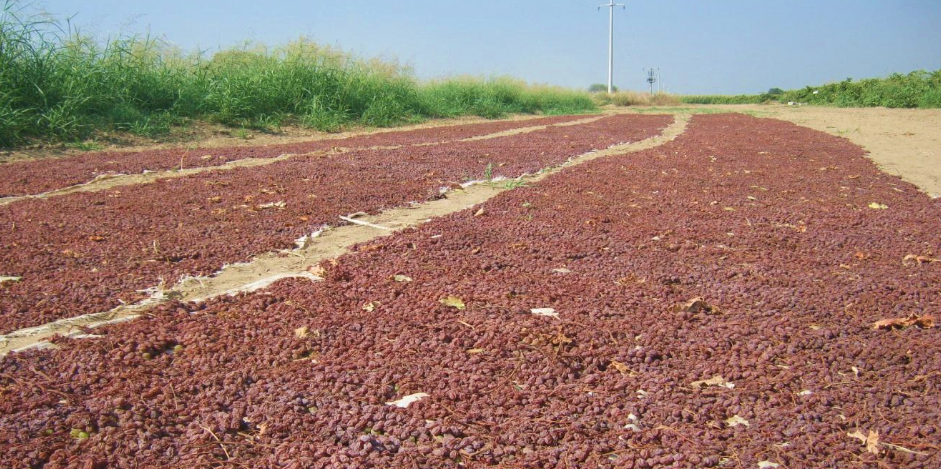
Introduction: The Rising Power of Dried Foods In the global food industry, demand for dried foods has been steadily increasing in recent years. Thanks to their long shelf life, preserved nutritional value, and logistical advantages, dried foods stand out among the preferred food processing technologies in both developed and developing countries. Fruits such as apricots, figs, and especially seedless raisins are among the most strategic products in the dried food sector.
These products are attracting attention not only as healthy snacks but also as high-value-added agricultural products with significant export potential. Turkey, with its historical production culture and natural climate advantages, holds a world-leading position in seedless raisin exports.
Turkey: World Leader in Grapes 📊 According to FAO data, approximately 77 million tonnes of grapes are produced worldwide each year. Turkey ranks 5th globally with 435,000 hectares of vineyards and 6th with 4 million tonnes of grape production. Roughly:
This distribution demonstrates the substantial economic value of dried raisin production in Turkish viticulture. The provinces of Manisa, İzmir, and Denizli are the heart of drying-grape production.
Dried Raisins and Other Products: Apricots & Food-Processing Technologies Dried apricots are another highly competitive dried food product for Turkey on the world market. Dried figs and hazelnuts can also be added to this list. These products generate high value both domestically and in exports thanks to advanced food-processing technologies.
Modern drying systems used especially in the Aegean and Southeastern Anatolia regions improve quality throughout the fruit-processing chain and ensure strong demand in international markets. These technologies enable producers to offer more competitive prices and support value-added export strategies.
Turkey’s Export Potential in Seedless Raisins Turkey is the world leader in both production and export of seedless raisins. In the 2016/2017 season, Turkey accounted for roughly 25% of global seedless raisin production. In the same period, it met 34% of world exports, making the country the most powerful player in the global market.
The İzmir Commodity Exchange forms the heartbeat of Turkey’s raisin market; the vast majority of exports pass through İzmir Port. The keys to Turkey’s export success are:
Main Export Markets The largest buyers of Turkish seedless raisins are:
These countries use dried foods extensively in their food industries and retail chains. Raisins appear widely in granola, breakfast cereals, baked goods, cakes, energy bars, and baby food.
Competition & Price Analysis Despite this success, Turkey faces competitive challenges. Export prices fell from $2.20/kg in 2012 to $1.55/kg in the 2016/17 season. The main reasons:
Turkey’s average raisin export price dropped 35% from $2.37/kg in 2011 to $1.50/kg in 2017, revealing difficulties in price competition and failure to protect product value.
The Future of Dried Foods: Value-Added Production Strategies Global healthy-eating trends are boosting interest in plant-based and minimally processed foods. In this context, dried foods—thanks to their functional properties, shelf life, and portability—are on the radar of both consumers and producers. For agriculturally strong countries like Turkey, these products offer enormous value-added potential.
🎯 Grapes, Apricots & Figs: The Triple Power
With food-processing technologies, these three products can be refined into high-margin items for global markets, for example:
The Role of Modern Food-Processing Technologies Next-generation drying techniques (vacuum drying, freeze-drying, etc.) produce goods that are:
than traditional sun-drying. Widespread adoption of these technologies in Turkey will standardise quality and secure a stronger foothold in quality-conscious markets such as the European Union.
Digital integration of traceability, residue controls, and analysis certificates will further boost export reliability.
Conclusion: A Strategic Export Item for Turkey Dried foods—especially seedless raisins, dried apricots, and figs—occupy a vital place in Turkey’s agricultural exports. Seedless raisins, with an 85% export ratio, world leadership in production, and broad market diversity, represent a strategic asset for the country.
For this success to be sustainable, the following steps must be taken:
5 Strategies for Sustainable Competitiveness in Dried Foods 1️⃣ Invest in Food-Processing Technologies – Support traditional drying with modern systems. Quality is now the decisive factor in exports. 2️⃣ Strengthen Producer Cooperatives – Bolster organisations like TARİŞ to increase purchasing power and stabilise producer incomes. 3️⃣ Comply with EU Residue Regulations – Replace pesticides such as chlorpyrifos with natural methods. Residue issues cause export losses. 4️⃣ New Markets & Branding – Target Asia and Gulf countries beyond Europe. Create a global brand for Turkish dried fruits. 5️⃣ R&D for Apricots & Raisins – Diversify products: packaged, organic, sugar-free, child-friendly healthy snacks, and other high-value formats.
References